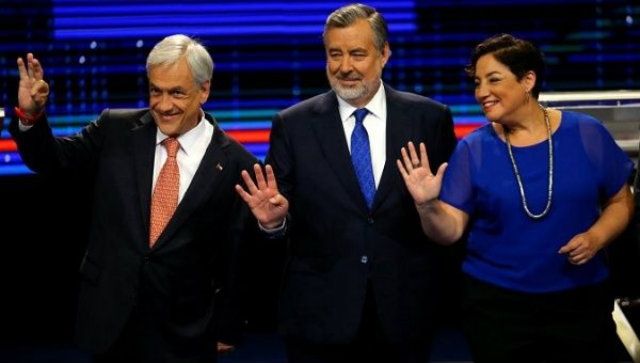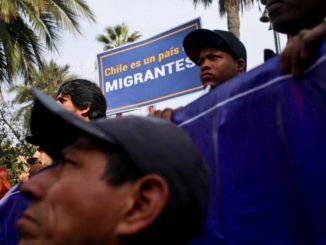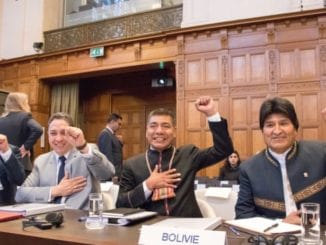
SANTIAGO – Today Chileans will choose a new president that will rule the country for the 2018-2022 period replacing current president, socialist, Michelle Bachelet. Senators, deputies and regional councilmen will also be chosen today (November 19).
On Thursday night, the eight candidates running for the presidency finished their campaigns. They are: Carolina Goic (Christian Democrat), Jose Antonio Kast (Independent, former UDI), Alejandro Guiller (Fuerza de la Mayoría), Beatriz Sanchez (Frente Amplio), Marco Enriquez-Ominami (PRO), Alejandro Navarro (PAIS), Eduardo Artes (Unión Patriótica) and former president, Sebastián Piñera (Chile Vamos).
The Center of Public Studies (CEP) predicts Piñera as the winner, with 44.4% of the votes, followed by Guiller (19.7%), and Sanchez (8.5%).
However, hours away from the vote, the electoral outlook is not encouraging. A law passed in 2015 restricted most of the candidates spending and prohibited political advertising in the streets. The current electoral climate is very different from that of past elections, in which established political parties filled the streets with fliers and other publicity goods. Also, since 2012, Chile has a system of voluntary voting.
Statistics project that nearly 60% of voters will abstain, for this reason, the United Nations Development Program, launched a joint campaign with different organizations, universities and public institutions to promote a high voter turnout.
Regardless of the trend, the UNDP says that “voter turnout in electoral processes in Chile has been systematically declining since the end of the nineties”.
In total, 14.3 million Chileans are eligible to vote. Also, for the first time, the 39,137 Chileans living abroad that registered in the electoral census will be allowed to vote. In order to carry the voting process abroad, a simultaneous project will be carried out in 54 countries. Most Chilean voters abroad live in Argentina (19%), the United States (13.7%) and Spain (8%).
In 2013, Bachelet won against her conservative rival by 63 percent. Turnout in recent Chilean elections however, has been notoriously low, with only 43 percent coming out for the 2013’s general elections and only 13 percent going to polls for the recent primaries.
Although Piñera maintains a lead in most polls, those opposed to the big-business-backed billionaire say that the election will ultimately be determined by voter turnout, with a low-turnout favoring the conservatives.
A major political question in this election is whether or not Chile will hold a constituent assembly to redraft the country’s Pinochet-era constitution, which is widely seen as inhibitive of progressive, democratic change.
Who’s Who in Nov. 19 General Elections
Sebastian Piñera

Conservative businessman and former president from 2010 to 2014, Sebastian Piñera has been ridden by corruption allegations, but that hasn’t stopped him from rising to the position of the anticipated front-runner, backed by the Lets Go Chile coalition. The Independent Regionalist Party, Independent Democratic Union, National Renewal, Political Evolution, and Amplitude party all back the right-winger.
Piñera has campaigned promising to implement neoliberal reforms, including laying off tens of thousands of public servants, and closing down the Employment and Training Office.
He has also emphasized being tough on crime and drug trafficking.The triumphant spirit of Piñera is evident, and his campaign team does not miss a chance to criticize the Michelle Bachelet administration. Only two scenarios might shake predictions. The previous abstention trend would change the political map if, as believed, voters’ decision tilts to the center-left.
The conservative candidate enjoys an advantage of more than 20 percentage points over the candidate from the ruling coalition New Majority, Senator Alejandro Guillier, but a second round might be needed on December 17.
However, the truth is that the other seven candidates fear the victory of a businessman in the first round.
Alejandro Guillier

Center-left social democrat Alejandro Guillier is running as an independent with the support of the New Majority coalition, of which current president Michelle Bachelet is a part.
The group of left and center-left parties supporting Guillier include the Communist Party, MAS Region, Citizen Left, Party for Democracy, Social Democrat Radical Party, and the Socialist Party.
The first-term senator and former journalist who launched the popular TV show Zero Tolerance is commonly viewed as an “outsider,” which helps distinguish him from the leadership of Bachelet while also continuing the legacy of the coalition that has won nearly every election since Chile’s return to democracy after the brutal military rule.
Calling himself the “President of the people,” Guiller has made employment for all, gender equality, public health, and the “construction of a more fair and inclusive country” the backbone of his campaign.
Recent polls show Guiller as being the runner up, although he has been unable to catch up to his conservative rival. Following Monday’s debate, 13 percent of those polled by Plaza Publica believed him to be the “winner,” as opposed to Piñera’s 21 percent.
Beatriz Sanchez

Beatriz Sanchez is a journalist and activist who is running as part of the up and coming Broad Front coalition, which emerged as an alternative left-progressive alternative to the New Majority, who many feel have been too slow to implement promised reforms.
The coalition is a diverse grouping of progressive, new-left, and liberal parties and protest movements, including the Humanist Party, the Liberal Party, Democratic Revolution, Poder, Green Ecologist Party, and the Equality Party.
Alongside groups within the New Majority, such as the Communist Party of Chile, the Broad Front has been vocal in pushing for the redrafting of Chile’s Pinochet-era constitution, which has inhibited the implementation of reforms.
Sanchez has had a surprising surge in polls, consistently polling at a close third place.
José Antonio Kast

From a family that held positions within the brutal Pinochet military regime, José Antonio Kast is running as an independent on a far-right platform, promising to crack down on “delinquency,” and be a “strong” president who will impose “public order” against supposed “violent marches” by protesters. He has notoriously called Chile’s Indigenous Mapuche protesters “terrorists.”
Marco Enriquez-Ominami

Marco Enriquez-Ominami, two-time presidential candidate, said that he will carry his campaign in Santiago this week with the expectation of shaking hands with at least 10,000 people.
The son of the slain leader of the Revolutionary Left Movement, Miguel Enriquez, said that according to some polls, he is barely two points behind Senator Guillier, so he expects to give a surprise and go against Piñera in the second round.
However, the center-left forces are divided, thus clearly favoring the former conservative president. A priori, Enriquez-Ominami and Senator Carolina Goic would defeat Guillier in the second round.
Both expect to be the protagonists: Enriquez-Ominami with the Progressive Party and Senator Goic with Christian Democracy.
Carolina Goic

The Christian Democratic Party candidate is running its own campaign with Carolina Goic, splitting the centrist party from the New Majority coalition, in which it previously aligned itself as the center-right wing of the governing coalition.
The socially-conservative party advocates a platform of moderate liberal reforms. They have largely struggled to garner a significant base of support since withdrawing from the New Majority coalition over disagreements with its more progressive wing.
Eduardo Artés

Artés is a teacher and the leader of the Chilean Communist Party (Proletarian Action), a smaller far-left Marxist-Leninist party that originated as a split from the now-defunct Maoist party, the Revolutionary Communist Party of Chile. Running on the Patriotic Union ticket, Artés is running on a communist, “anti-revisionist” platform.
Only 2 percent of those polled believe he “won” the most recent debate.
Alejandro Navarro

The Senator of Chile’s Bio-Bio province founded the Pais party, which puts forward a progressive, socialist agenda, last year. Navarro, who was formerly of the MAS party, which supports Guillier’s New Majority, is the Pais party’s candidate. Key agenda points include an opposition to the wildly unpopular AFP pension system, and pushing for free, universal education.
He has also spoken out in support of Venezuela, comparing the economic war against the Bolivarian revolution to the coup carried out against former Chilean leftist president, Salvador Allende.
Polls place him significantly behind all the major coalitions.



